Subtitles improve video views and engagement. They also help viewers focus more on your content and even remember it better.
Creating subtitles for videos doesn’t have to be a time-consuming, energy-sucking step in your workflow though. In fact, you can quickly and easily add on-brand subtitles to your videos with a click of a button using VEED.
Here’s how:
- Log in to your VEED account and click Create Project
- Upload the video directly from your desktop
- Click Subtitles from your dashboard’s left and select Auto Subtitle and you’re done

You can also add to the subtitles VEED generates and edit the text for better readability.
What’s more, you can change the subtitle text’s font to a branded font, animate the text, change and remove the background, and translate the video — using one, easy-to-use video editor 😍
Let’s show you how to do all of this and more.
Here’s what we’ll cover:
- How to automatically subtitle video with VEED
- How to customize subtitles with VEED (change font type and size, subtitle style, spacing, and capitalization)
- How to translate subtitles with VEED
- How to download a subtitle SRT file with VEED
Before we start, we’ll also quickly recap how subtitling videos is beneficial and how subtitles differ from captions.
Let’s go:
Why does adding subtitles make your videos better?
From making your videos accessible to improving their SEO and getting you more viewers, subtitles help in a ton of different ways. Let’s look at them one by one:
- Subtitles get you more viewers — both on social media and search engines
When Facebook tested out video ads with and without captions, they learned that ads with captions were watched 12% longer on average than non-captioned video ads.
In their study, they also learned that 80% of viewers reacted negatively to the advertiser and the platform when feed-based mobile video ads played loudly.
That said, subtitling videos also helps Google understand how relevant the content is to the target keyword. In turn, this boosts your SEO ranking, increasing video traffic by almost 7% on average.
- Subtitles make your video content accessible
1.5 billion people in the world are hard of hearing. 430 million among them have disabling hearing loss. Subtitling videos opens the content to these folks.
- Subtitles improve learning and comprehension of the content
Research confirms adding subtitles not only helps non-native English speakers but also able, literate adults in learning and retaining information.
- Subtitles improve viewers’ focus
Subtitles encourage viewers to pay more attention to the video content — even improve their memory of it. In fact, 42% of students use captions to maintain their focus on the video they’re watching according to a study by the University of South Florida. Meaning: video subtitles are an effective asset for creators putting out educational content to engage their audience.
What’s the difference between subtitles and closed captions?
Briefly, subtitles are added to help viewers understand the narrative — for example in cases where they can’t understand the language, can’t keep up with the narrator’s accent, or are watching the content on mute.
On the other hand, captions are included for viewers who can’t understand the entire audio content (they can’t hear the background sounds and can’t distinguish between speakers’ voices, for example).
Here’s a full breakdown of how subtitles and closed captions compare with a quick summary below:
[#TOC1]How to automatically add subtitles to a video with VEED[#TOC1]
On to the meaty bit now: the easiest way to add subtitles to a video:
1. Go to VEED.io and click Create Project to upload the video
Log in to VEED (doesn’t require downloading) and select Create Project.

If the video you want to caption is already saved on your desktop, choose the Upload a File option instead.
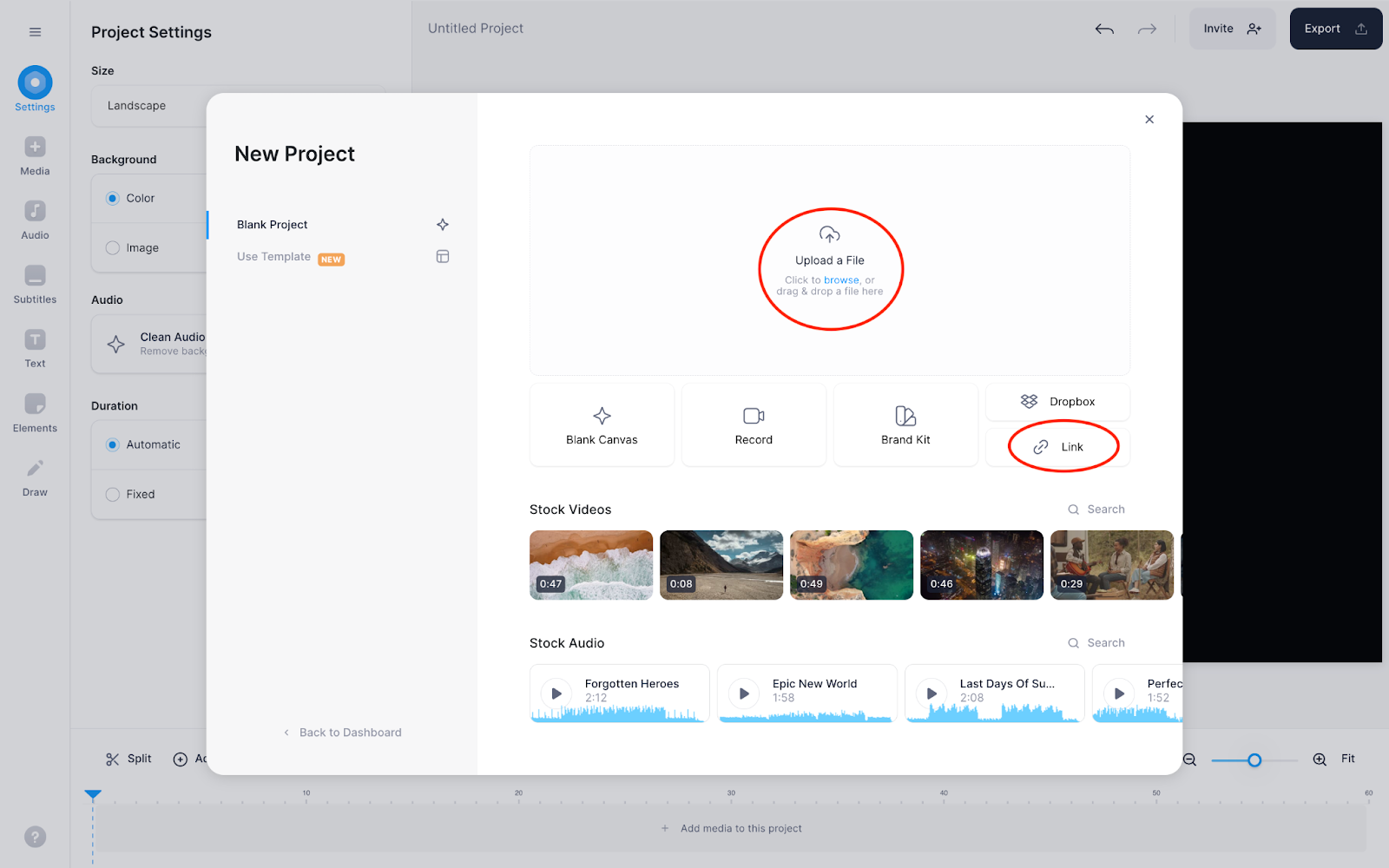
2. Select Subtitles from the left side of your video dashboard
After you’ve added your target video to the editing dashboard, click on Subtitles.
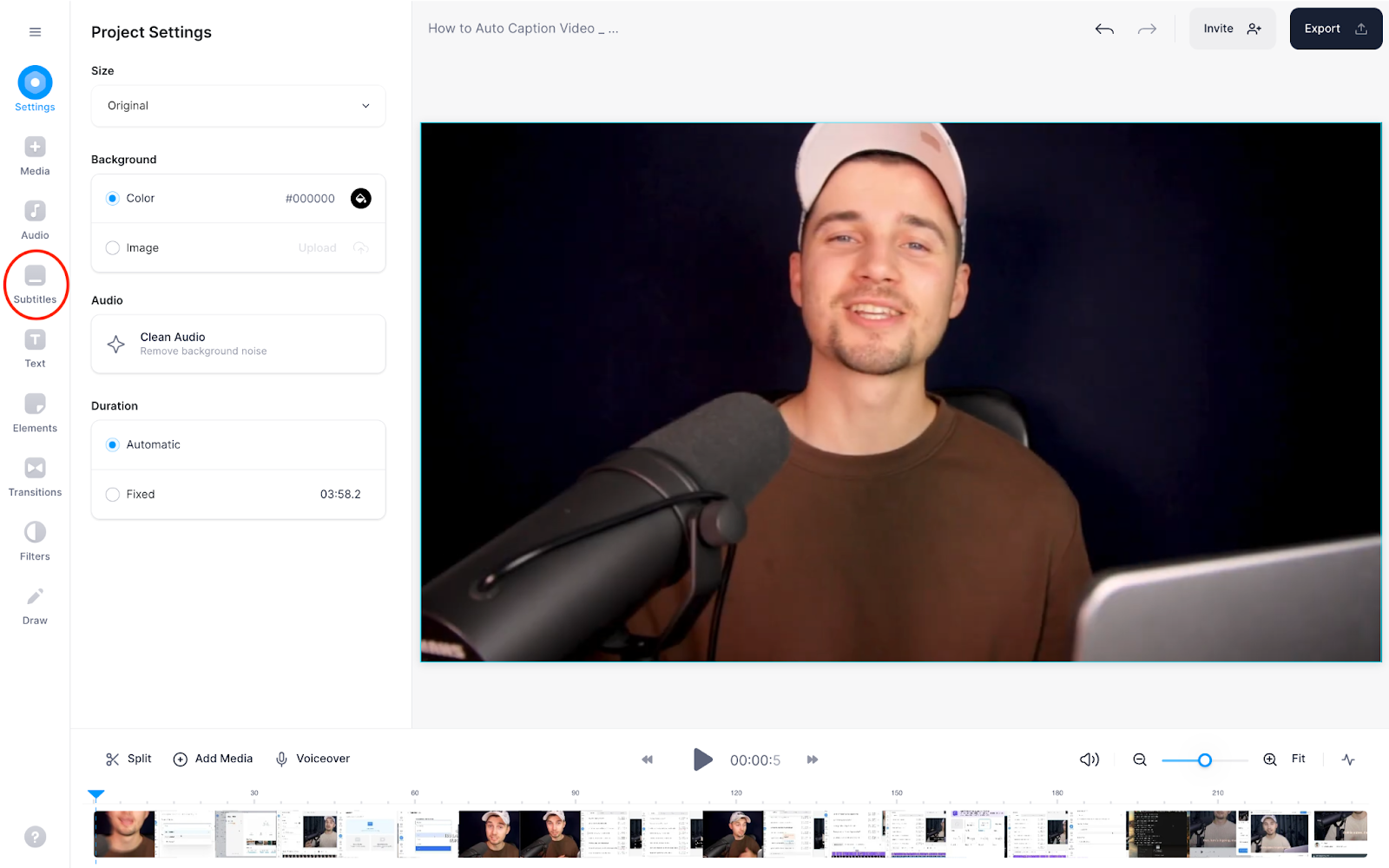
This will give you three options:
- Auto Subtitle
- Manual Subtitles
- Upload Subtitle File
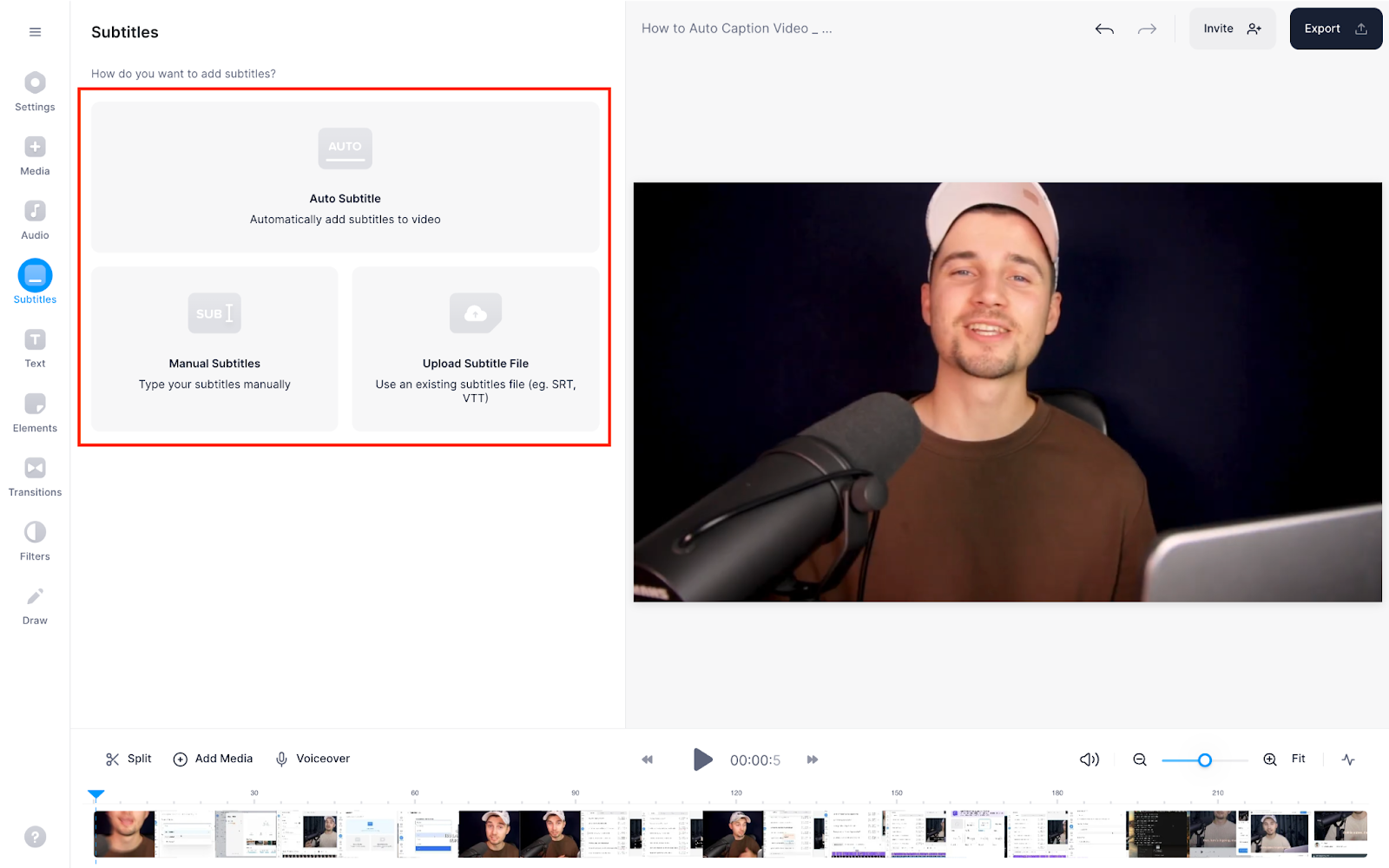
Auto subtitle is the fastest and easiest way to add subtitles to a video. After you click Subtitles, select the language you want to add the captions in, and boom — a few seconds later you’ll have a subtitled video ready.
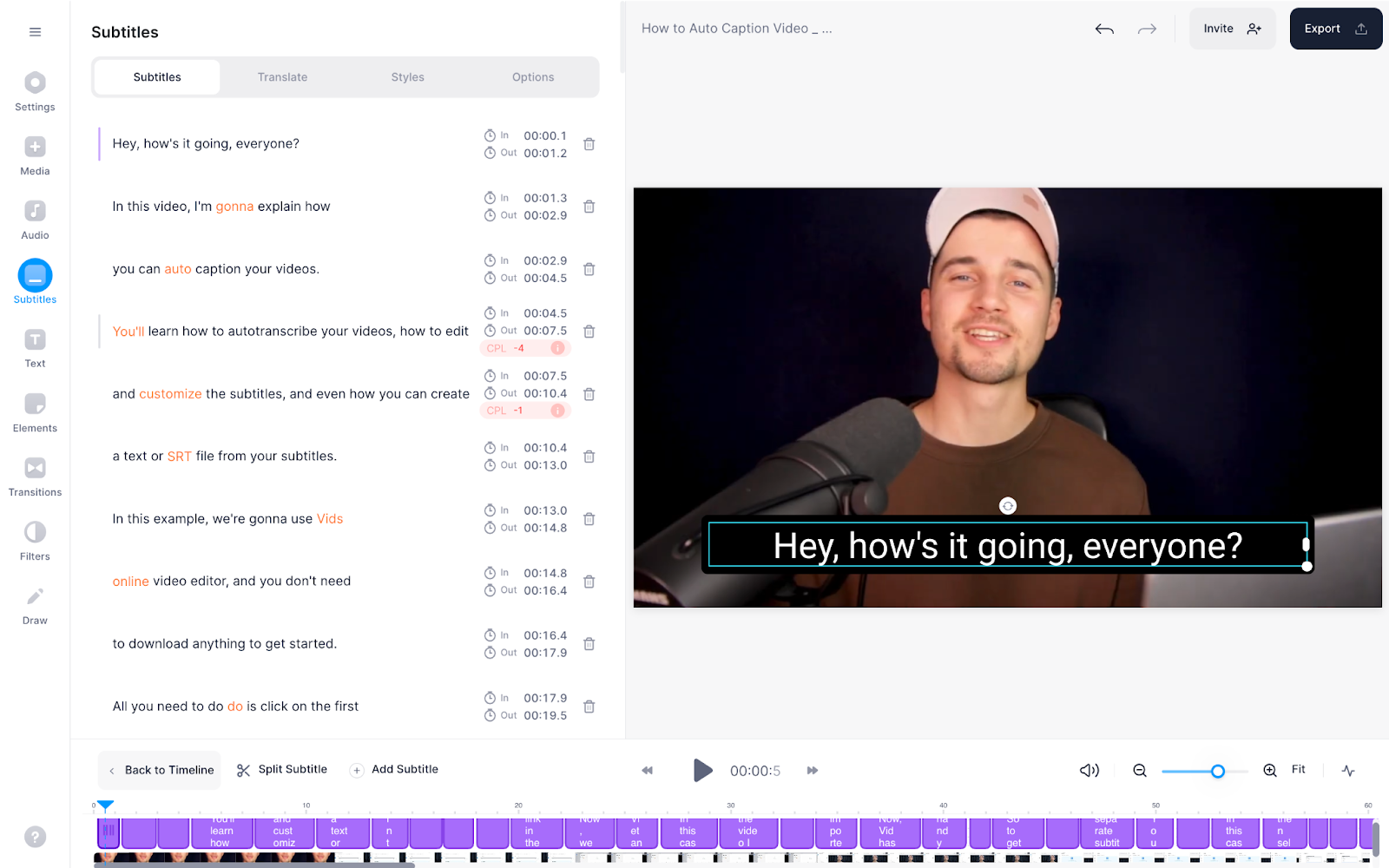
The best part? VEED’s auto subtitles are as accurate as AI can get.
With most cases other tools, you’ll get less than 75% of the subtitles correct. With VEED though, about 95% of the auto-generated subtitles are spot-on. The cherry on top? We’ve a low-confidence word feature that highlights words that may be auto-transcribed wrong. This makes proofreading your subtitles a walk in the park as the editor points out words that need your attention the most.
If you prefer adding video captions yourself, choose Manual Subtitles. In case you already have a subtitle file ready to use, select Upload Subtitle File.
3. Review your subtitles
Last step: after you’ve manually or automatically added your subtitles, read through them for any inaccuracies or mistakes.
Also, review how they’re displayed in the video preview screen on the right side. Make sure the subtitle text isn’t running into long sentences as those can be hard to read. If it is, split the sentence(s) to make it easy to read and keep up with.
To do so, simply go to the long sentence in the text editor on the left and hit enter where you want to split the text.

If needed, you can also combine two short lines by hovering between them and clicking on Merge.

[#TOC2]Navigating VEED’s subtitle customization options[#TOC2]
You’re good to go after you automatically subtitle your video with VEED. But if you want to personalize the subtitle text to improve viewers’ experience further — say by changing their style or using your branded font, then this section is for you.
Before we move on though, keep in mind that your aim should always be to make subtitles easy to read.
Not paying attention to the text’s readability can negatively impact viewers’ experience with your content. For example, long sentences are challenging to read. Similarly, if your video subtitles’ color blends in with the content’s background, they won’t be of any help to viewers.
With that out of the way, here’s how you can customize your video captions with the VEED video editor:
How to change your subtitle font
VEED auto-generates subtitles in a readable font (Roboto).
If it’s not your style and you want to switch to a more readable subtitle font like Open Sans, Lato, Poppins, or Rubik, go to Styles in the top main menu of the subtitle board.
Now change the font from under the Customize menu.
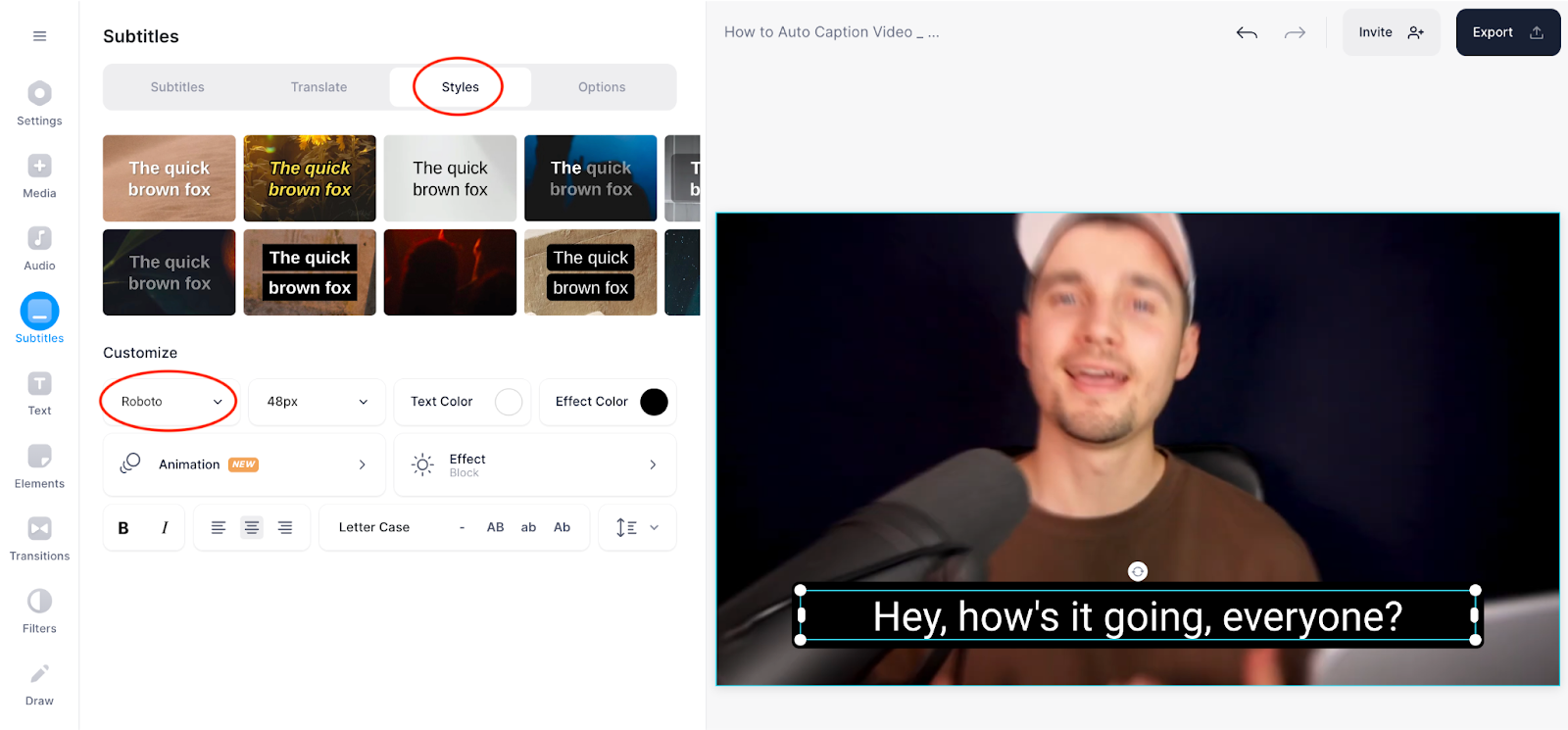
Want to personalize your video content by adding a custom brand font? You can easily do so by selecting Upload a font from the font list drop-down menu.
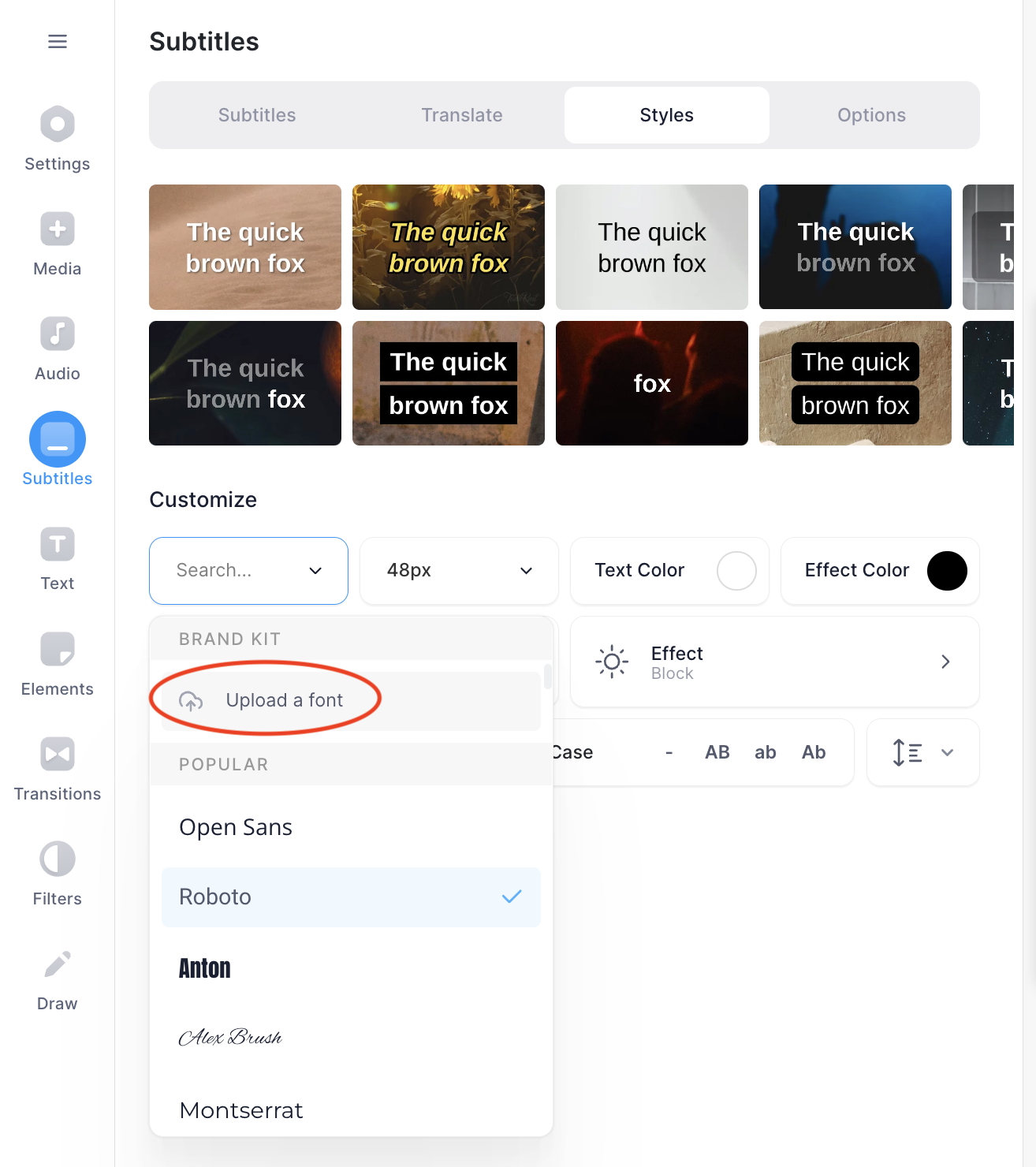
Once you’ve added your custom font, it’ll start showing in the font list menu when you reopen it. Select your branded font from here and you’ll see the on-brand subtitles in the preview window.
How to change your subtitle’s style
To add more personality to your subtitles, play with the bunch of options available in the Styles menu.
Start with choosing from the available Effects. Select the one you like the most and preview it on the right side to pick the best one.

You can also change the subtitles’ size and text and effect colors from under the Customize corner.
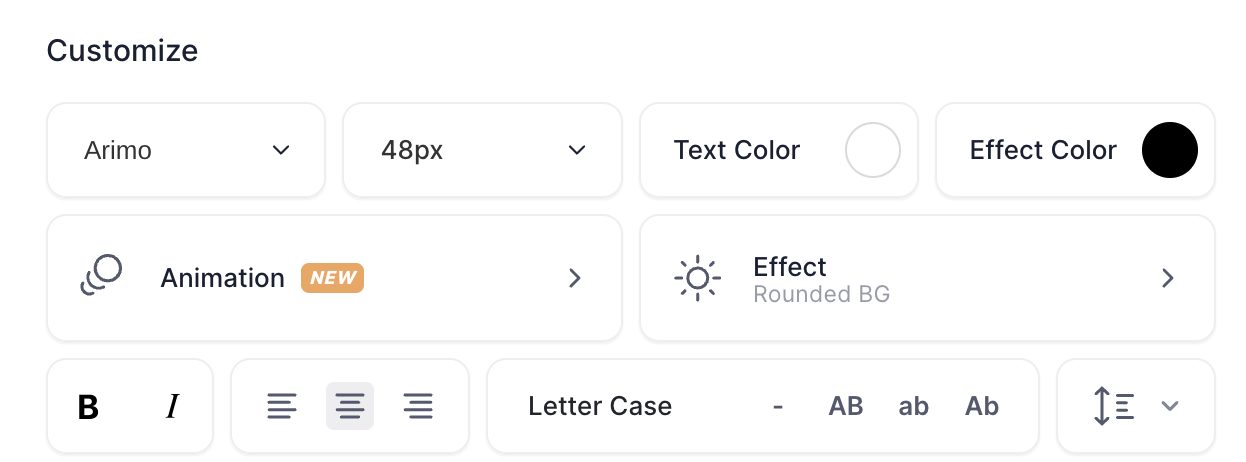
When tweaking the font size, always keep readability in mind.
Don’t go with anything that’s too small that it becomes hard to read. Similarly, avoid going with large text that takes up most of the screen space. 22-28 pt font size is an ideal size to choose from.
That said, the Text Color font lets you change the subtitle text’s color.

Choose any color from your brand colors to the standard white and black — just be sure to take color contrast into account. Meaning: your subtitle font color shouldn’t blend in with the video as that makes them challenging to read.
Keep accessibility in mind as you pick your font’s color by using WebAIM for checking the color contrast.
As for the Effect Color box, it lets you change the color of the subtitles background box.

Again, keep color contrast and readability in mind. Use the preview window to see how the subtitle font color goes with its background color.
If you want to eliminate the text background effect altogether, select a style that removes it.
There are a few more customization options as well. These are:
- Use the Effect option to tweak the subtitle background. For instance, by choosing Rounded BG, you can achieve a text background with rounded corners.
- Use Animation to change the way subtitles display when your video plays. For example, selecting the Karoke style means each word in the subtitle sentence lights up as the speaker says it.
Should we add GIFs to these??
How to change the size, spacing, alignment, and capitalization of your subtitles
Finally, you can also change your video subtitles’ spacing, capitalization, and alignment. All these options are available in the last bar in the Styles corner.

Change the text’s alignment using the alignment option beside the option to italicize your subtitles.
Pick from the options to use all caps, lower case, and letter case options from the AB, ab, and Ab buttons, respectively.
As for changing the text’s line height and letter spacing, use the last button in the bar.

[#TOC3]How to translate subtitles with VEED[#TOC3]
VEED video editor helps auto-translate subtitles too. This is perfect for creators targeting audiences in different countries using the same video but with different language captions.
Simply select Translate from the Subtitles main menu on the extreme left of the dashboard.
Now click on + Add language and choose from the three options that show:
- Translate automatically
- Manually translate
- Upload

As with auto-generating subtitles for videos with VEED, you can simply pick Translate automatically to let the video editing software do the heavy lifting for you.
When you select this option, you’ll see a drop-down menu asking for a language you want to translate your subtitles in. Choose and hit Translate to [language]:
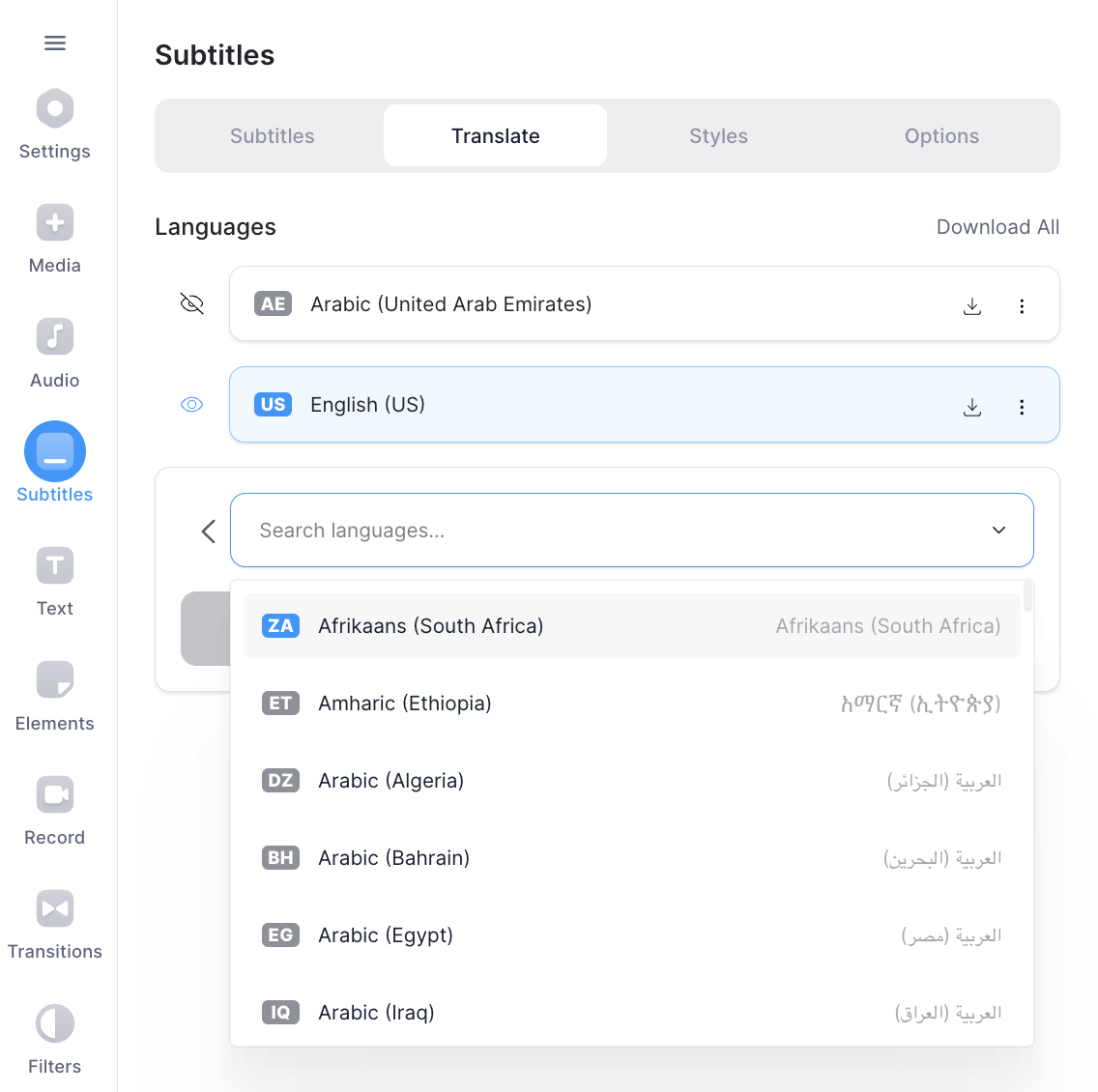
VEED then translates the subtitles for you. Select Subtitles beside the Translate option in the menu and review the entire translated text for correcting any errors.

If you prefer manually adding subtitles, select the Manually translate option. Or pick Upload if you’ve a translated subtitle file ready to use.
[#TOC4]How to download a subtitle SRT file with VEED[#TOC4]
To download the auto-generated subtitles as an SRT file, go to Options from the menu on the top.
Go to Download Subtitles next and pick a file format from the drop-down menu.

Once down, click on the download tray icon beside the dropdown menu and your download will start. You’ll likely find the downloaded file in your downloads. That’s all. Easy-peasy.

Why stick with VEED to add subtitles to your videos
Adding and customizing subtitles with VEED mostly takes a handful of clicks with auto-generating subtitles being a one-step thing.
We’re also confident our AI generates 95% accurate subtitles. This leaves you with only one task: proofreading the subtitles to double-check for accuracy and merging or splitting text as needed.
As for creators who want to improve their viewers’ experience further — there are lots of easy ways to customize subtitles (animate them, change their background, use custom fonts, and more).
You can also increase your videos’ reach further by auto-translating the subtitles to different languages.
All of this makes it clear: VEED helps save lots of time and money on top of being easy to use. Think of it like this: you can use the video suite of tools to:
- Record videos. VEED is best for creating screen-recorded product demos, how-to explainer videos, social media videos, and for live streaming.
- Edit videos. Edit the video you create from the same tool you made it with. Add and customize subtitles, resize the video, include transition effects, trim sections out, and more. In fact, you can also collaborate with a team member(s) or partner(s) on editing the video using workspace collaborator invites.
Since you can do it all from one tool, you can not only save money (say goodbye to a bunch of different subscriptions you use to do different video editing jobs) but also save yourself from the headache of jumping between tools.
In short, VEED helps you worry less and work smart — all with less mental strain for the work you need to put into completing one video.
But you don’t have to take our word for it. Take it from people like you who are already using VEED.
Here’s what Chris says:
“Veed allows for subtitling, editing, effect/text encoding, and many more advanced features that other editors just can't compete with. The free version is wonderful, but the Pro version is beyond perfect.”
And Christian wrote:
“VEED quickly and accurately analyzes videos to create subtitles, with minimum errors. The website is mobile friendly and text styles are customizable using known fonts and colors. You can also choose video size based on the application you will be uploading to.”




